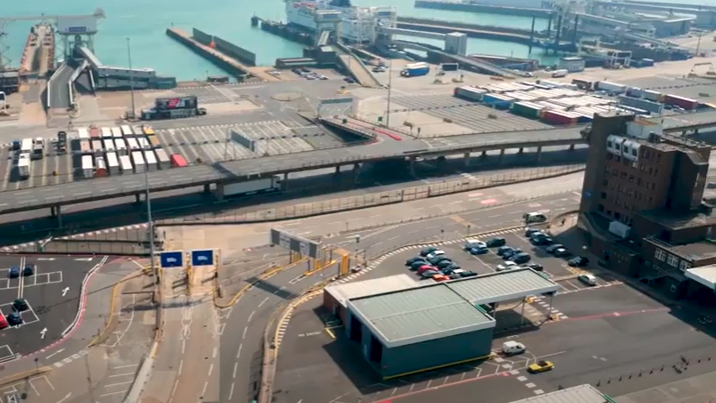“I’d really encourage any organisation to reach out to the University of Kent, even if you don’t know the specific parts or nature of the KTP you want or might benefit you most. There is an absolute wealth of world-renowned expertise across the University, and within the Kent Business School, that can help you.”
Christian Pryce, Chief Commercial Officer, Port of Dover
The Challenge
Delays or capacity issues can affect traffic fluidity and the Port of Dover’s smooth operation. In extreme situations, this can have a significant impact on local communities as queuing traffic makes it hard for them to use the road infrastructure and CO2 emissions also increase. When lorries can’t move freely through the port, this has wider economic effects that profoundly impact the £144 billion of UK trade which is reliant on the port each year. Although the port has an incredible track record of being able to rapidly clear colossal volumes of traffic when large queues do occur, the port wants to try and avoid such circumstances in the first place.
An initial KTP between the University of Kent and the Port of Dover aimed to improve traffic flow through the Eastern Docks (the main ferry terminal). The project identified where was best to hold traffic to minimise the negative effects when the terminal was operating at capacity. The project experimented with holding vehicles in two different locations, at the point of embarkation and in a buffer-zone on the A20 known as the Dover TAP (Traffic Assessment Project). The insight from the KTP helped reduce the need to use the A20 facility to only once every 5 days.
However, since then, Brexit has introduced more complexity into getting through the border control process and onto the ferries. This is requiring radical changes at the port to better accommodate these new requirements without causing delays and blockages.
The Approach
Professor Jesse O’Hanley of the University of Kent Business School (KBS) and the Port of Dover decided to work together again and applied for funding for a new KTP to address the issues that life outside the EU was bringing to the port.
The University of Kent has a 100% success rate in securing KTP funding and extensive experience of the application process, which reduces the administrative burden on businesses. The funding allows businesses to work with academics on strategic projects to achieve their ambitions. KTPs also allow businesses to access significant funding, which ensures more value for money on R&D spend and a greater return on investment.
This KTP has, at its heart, the objective of optimising and redesigning the port’s traffic management and infrastructure investment in the face of significant post-Brexit regulatory changes. Additionally, it seeks to drive digitalisation and decarbonisation.
Knowledge is being acquired through a state-of-the-art simulation method, known as agent-based modelling. This works by making a virtual twin of the port, which can have operational or configuration changes made to it. This allows the impact of adding resources to a particular area to be captured in a safe, cost-effective virtual way, enabling fine tuning of the port’s operations.
The Results
The cutting-edge academic research emerging from this KTP is helping the Port of Dover to achieve its challenging ambitions.
The university’s academic team now involves two further specialists in addition to the Academic Lead, an Academic Supervisor (Prof. Kathy Kotiadis) and Academic support (Prof. M. Paola Scaparra). This team has played a crucial role in the recruitment of an Associate with specialist skills to deliver the project who is jointly managed by the University and the Port of Dover. The Associate works in post within the company, giving the business a chance to see how well they fit in which facilitates a potential employment opportunity in the future.
Current KTP activities are focussed on modelling scenarios, including check-in and border processes. These investigations will identify what different ‘digital borders’ could exist for the port together with understanding how digitising processes could reduce the strain on the physical port.
The University of Kent brings together businesses and academics from across their KTP programme, helping them to form connections and build long-term relationships. While this KTP runs until January 2025, it is already bringing expertise to the port that isn’t available in-house.
The strategic insights that the KTP is starting to uncover will help decision-making and planning. The Port of Dover are confident that this KTP will result in their business being able to respond more dynamically to day-to-day external factors, such as roadworks and weather issues, as well as more fundamental post-Brexit implications.
This can only have positive benefits for a vitally important trading hub.

